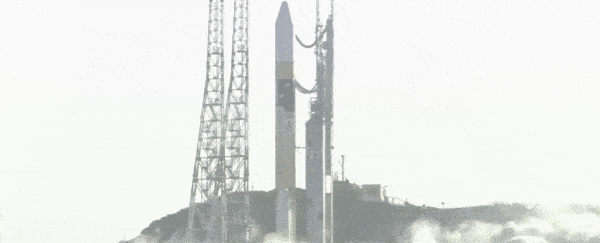The first Arab space mission to Mars blasted off Monday aboard a rocket from Japan, after weather delays set back the launch of the probe dubbed 'Hope'.
A live feed of the launch showed the rocket carrying the uncrewed probe, known as "Al-Amal" in Arabic, lifting off from the Tanegashima Space Centre in southern Japan.
"We have launched the H-IIA Launch Vehicle No. 42 (H-IIA F42) carrying aboard the Emirates Mars Mission's (EMM) HOPE spacecraft… at 6:58:14 (JST) (21:58 GMT)," rocket manufacturer Mitsubishi Heavy Industries said in a statement shortly after the launch.
Five minutes after launch, the rocket carrying the probe was on course, carrying out the first separation of its flight.
The Emirati project is one of three racing to Mars, including Tianwen-1 from China and Mars 2020 from the United States, taking advantage of a period when Earth and Mars are nearest.
In October, Mars will be a comparatively short 38.6 million miles (62.07 million kilometres) from Earth, according to NASA.
'Hope' is expected to reach Mars's orbit by February 2021, marking the 50th anniversary of the unification of the UAE, an alliance of seven emirates.
Martian year of orbit
Unlike the two other Mars ventures scheduled for this year, it will not land on the Red Planet, but instead orbit it for a whole Martian year, or 687 days.
While the objective of the Mars mission is to provide a comprehensive image of the weather dynamics in the Red Planet's atmosphere, the probe is a foundation for a much bigger goal - building a human settlement on Mars within the next 100 years.
The UAE also wants the project to serve as a source of inspiration for Arab youth, in a region too often wracked by sectarian conflicts and economic crises.
The "Hope" probe is expected to detach from the launch rocket about an hour after blast-off.
That's when the real excitement will begin, UAE Mars mission's deputy project manager Sarah al-Amiri told AFP before the launch.
"In my heart of hearts, I'm looking forward to the initial 24 hours after separation, and that's where we see the results of our work," said Amiri, who is also Minister of State for Advanced Sciences.
"It is when we first get the signal, when we know that every part of the spacecraft is functioning, when the solar panels are deployed, when we hit our trajectory and are headed towards Mars," she told AFP earlier this month.
'Holistic view'
Several dozen probes - most of them American - have set off for the Red Planet since the 1960s. Many never made it that far, or failed to land.
The drive to explore Mars flagged until the confirmation less than 10 years ago that water once flowed on its surface.
Omran Sharaf, the mission's project manager, has said the 'Hope' probe will offer a special perspective on the elusive red planet.
"What is unique about this mission is that for the first time the scientific community around the world will have an holistic view of the Martian atmosphere at different times of the day at different seasons," Sharaf told a pre-launch briefing.
"We have a strategy to contribute to the global effort in developing technologies and science work that will help one day if humanity decides to put a human on Mars."
The UAE already has nine functioning satellites in orbit, with plans to launch another eight in coming years. And in September, it sent the first Emirati into space on a mission to the International Space Station.
But the UAE's ambitions go well beyond that, with a goal of building a human settlement on Mars by 2117.
